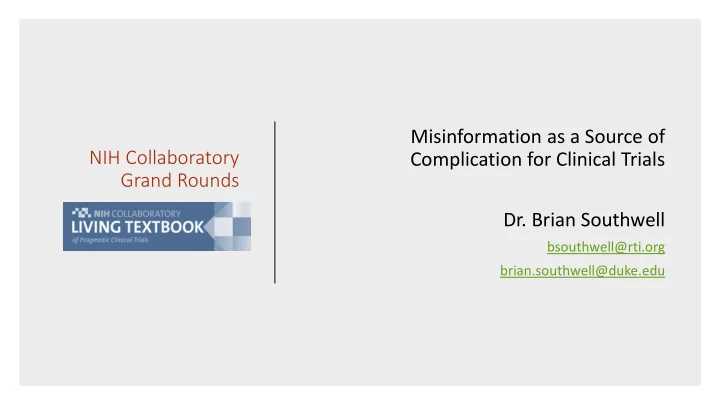

Misinformation as a Source of NIH Collaboratory Complication for Clinical Trials Grand Rounds Dr. Brian Southwell bsouthwell@rti.org brian.southwell@duke.edu
Is misinformation a prime suspect for clinical trial refusal or treatment avoidance?
Does misinformation reduce clinical trial participation? • Information reach – lack of information – is major concern: • Many patients willing to enroll yet few invited (DasMahapatra et al., 2017) • Misinformation also likely discourages trial participation. Source: DasMahapatra et al. (2017). Clinical trials from the patient perspective: survey in an online patient community. BMC Health Serv Res . 2017; 17: 166. doi: 10.1186/s12913- 017-2090-x
Misinformation about clinical trials? Cleveland Clinic dispels key myths, including: • “Informed consent exists primarily to protect researchers’ legal interests” • “Clinical research patients are taking sugar pills” • “You need to live near a major hospital to participate” Source: https://health.clevelandclinic.org/10-biggest-cancer-clinical-trial-myths-busted/
Misinformation and distrust of treatment? • Example: Navar (2019) warns of inaccurate online claims that statins cause memory loss, cataracts, pancreatic dysfunction, Lou Gehrig disease, and cancer . Source: Navar, A. M. (2019). Fear-based medical misinformation and disease prevention: From vaccines to statins. JAMA Cardiology . Available online: doi:10.1001/jamacardio.2019.1972
Misinformation and distrust of treatment? • Example: Navar (2019) warns of inaccurate online claims that statins cause memory loss, cataracts, pancreatic dysfunction, Lou Gehrig disease, and cancer . Source: Navar, A. M. (2019). Fear-based medical misinformation and disease prevention: From vaccines to statins. JAMA Cardiology . Available online: doi:10.1001/jamacardio.2019.1972
From whence does misinformation arise? Questionable websites attempting to sell products...
From whence does misinformation arise? But also health education from advocacy organizations…
From whence does misinformation arise? And even through diffusion of conventional journalism...
From whence does misinformation arise? Brody mentions FDA reference to risk of reversible memory loss but puts it in appropriate context.
Do we misunderstand misinformation ? 11
Do we misunderstand misinformation ? : • Misinformation is not all equal in consequence. • New media platforms differ from old in authorship, oversight, and algorithms. • Misinformation can have indirect effects aside from acute, short-term ones. • Misinformation correction may itself have unintended consequences. • System-level challenges warrant system-level, future- oriented remedies. 12
Emerging literature on misinformation highlights our own humanity. Avoid using sentences that will already be used when talking
Do we misunderstand our own vulnerabilities ? 14
We need social connection. Do we misunderstand We need hope for future. our own vulnerabilities ? The lack of either affords opportunity for medical misinformation effect. 15
Image: The Australian Women’s Weekly
“Anti -vaccination activists have enjoyed particular success in communities whose cultural isolation makes them easy prey for misinformation.”
Our multifaceted vulnerabilities biased toward acceptance reasons why we share regulatory approach • Correction is hard 18
Was Spinoza right? Images sources: Encyclopædia Britannica and biography.com
Why do people share misinformation?
Why do people share misinformation? Some possibilities other than malice: • Accidental or unintended spread • Our needs for social bonding • Information seeking and efforts for validation
Why rumors spread
Why rumors spread • Discomfort of uncertainty • Lack of corrective information • Also: information as potential relationship currency
Might emotions make us vulnerable? • Yes. • Anger encourages inaccurate information acceptance. Example: Weeks, B. E. (2015). Emotions, partisanship, and misperceptions: how anger and anxiety moderate the effect of partisan bias on susceptibility to political misinformation. Journal of Communication, 65 , 699-719.
Our reactive regulatory tendency doesn’t guarantee misinformation won’t appear
Studies support some corrective potential… • Aikin et al. (2015). Journal of Communication . • Aikin et al. (2017). Research in Social and Administrative Pharmacy . • Bode & Vraga. (2015). Journal of Communication .
Studies support some corrective potential… • Aikin et al. (2015). Journal of Communication . • Aikin et al. (2017). Research in Social and Administrative Pharmacy . • Bode & Vraga. (2015). Journal of Communication . … direct rebuttal and large-scale exposure needed.
Is misinformation culprit? Are we partly culpable? Are we vulnerable to medical misinformation? • Yes Is misinformation ever sown for others’ gain? • Yes Is misinformation sharing between patients illogical or malicious? • Not necessarily Is there a path forward? • Yes
What if…
What if… • we find (and share) misinformation when earnestly searching for answers?
What if… • we find (and share) misinformation when earnestly searching for answers? • we would turn to peer-reviewed research if it was accessible, available, and trusted?
What if… • we find (and share) misinformation when earnestly searching for answers? • we would turn to peer-reviewed research if it was accessible, available, and trusted? • we could inoculate people against inaccurate sources while acknowledging common questions and concerns?
What do we need to do? 33
What do we need to do? • Consider interaction of human psychology, news norms, governance, and health systems. 34
What do we need to do? • Consider interaction of human psychology, news norms, governance, and health systems. • Monitor and seek to understand – rather than prejudge – patient information environments. 35
What do we need to do? • Consider interaction of human psychology, news norms, governance, and health systems. • Monitor and seek to understand – rather than prejudge – patient information environments. • Build and maintain trust between health care systems and patients by acknowledging shared interests. 36
Dr. Brian Southwell brian.southwell@duke.edu Let’s connect. bsouthwell@rti.org @BrianSouthwell
Recommend
More recommend